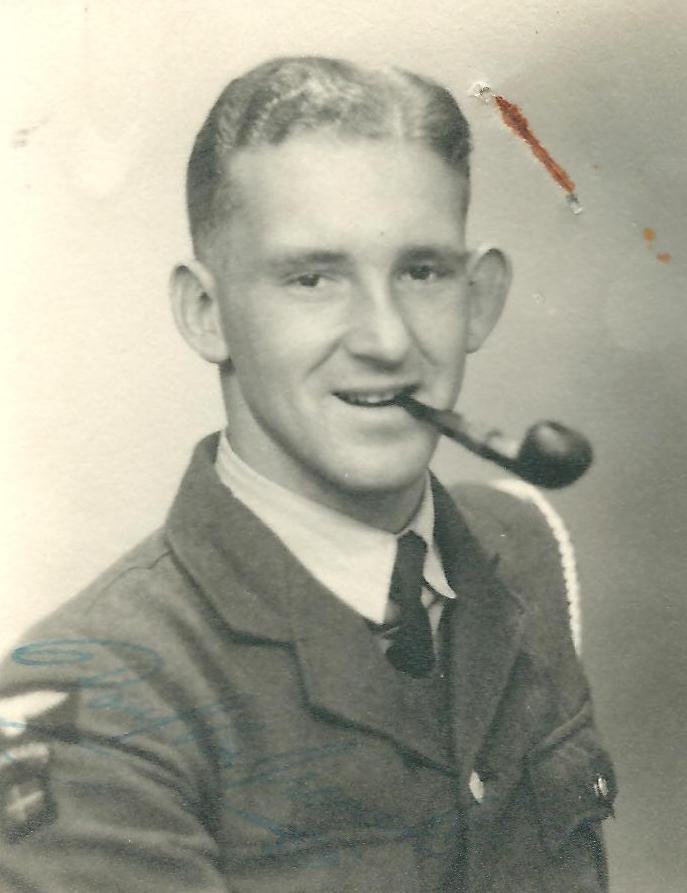Poul Bruno Arends
(1924 - 2002)
Profile
Poul Bruno Arends arrived in London in december 1943 from Ecuador. The family had moved there from Finland in 1939 to escape the Finnish-Russian war. He enlisted in the Royal Air Force in early 1944.
Poul Bruno Arends was born on 4 July 1924 in Irkutsk, Siberia, in the then Soviet Union. He was the son of Poul Arends, who was an employee of the Great Northern Telegraph Company, and Eugine Sophie Arends (née Meissen). Arends’ mother was of Russian nationality by birth.[1]

In 1931, Arends and his mother moved from Irkutsk for health reasons and went to Libau in Lithuania to live with his grandparents. The following year the family rejoined in Copenhagen, and in 1933—following the retirement of the father—the family moved to Gröndal (Viherlaakso) in Finland, where the father bought a small fruit and chicken farm. The family remained in Finland until 1939 at which, owing to the Russo-Finnish war, they decided to leave Finland and return to Denmark.[2]
Ecuador
In March 1940, the family left Copenhagen and travelled to Equador via Gothenburg and New York. Some months before the family left Finland, Arends’ father had been in communication with his brother, who was living in Equador. The family settled in near Ambato, where the father had bought a farm.
Arends remained with his father helping him to build their home and starting the plantation until November 1942. He got in touch with the Cotopaxi Exploration Company worked in the firm’s Assay Office and Laboratory until in April 1943.[3]
Royal Air Force
Arends had been in contact with the British Consul for two years at this point, trying to join the British Forces. In April 1943, it looked like the effort was going to rewarded. He gave up his job and returned to the family farm to help out until he eventually left for the United Kingdom. Arends left for Balboa by aircraft on 5 November 1943. He joined the SS Northumberland in Colon and via New York he arrived in Liverpool on 3 December 1943.
He was interviewed at the London Reception Centre at the Royal Victorian Patriotic School (RVPS) in 8 December 1943. This centre, which was run by MI5, was an alien clearing station. It is clear from the interview that he had provided intelligence to the American Legation in Ecuador from early 1942, and that he later continued to work for the British Legation. He hoped that the effort would help him join the British Forces.
Arends joined the Royal Air Force Voluntary Reserve at the Euston Recruitment Centre on 7 February 1944 (2236075).[4] He served as an Aircraftman Second Class. According to Ancker (2001), he served as an aircraft mechanic, but the origin of this information is not certain.
After the war, he was in Bergen Belsen as an interpreter as an interpreter, making use of his language skills. He served in Germany for two years from 1947.[5]
The Cold War
After the war, Arends worked for the Danish Security and Intelligence Service. Nicknamed “the Russian” he was considered a talented translater, with a rare talent for intelligence work and great analytic skills. He has the ability to sense if anything was out of the ordinary, an ability which was important when the Russian intelligence officer Oleg Gordijevskij was turned in 1974. In his spare time he translated comics.[6]
Endnotes
[1] DNA: Parish register, Hjørring Sogn.
[2] NA: HS 9/50/5, Poul Bruno ARENDS - born 07.1924.
[3] Ibid.
[4] NA: AIR 78/5/1.
[5] Interview with the Arends family.
[6] Davidsen-Nielsen, H. (2008). En højere sags tjeneste: PET under den kolde krig (A higher calling: the Security and Intelligence Service during the Cold War), pp. 30, 54-55 and 191.